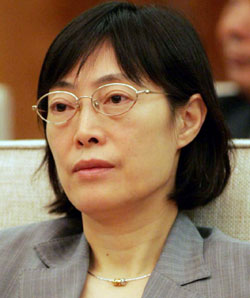China to expand channels for capital outflow
Updated: 2007-10-24 07:26
The State will improve management of its massive foreign exchange reserves and satisfy trade and investment needs, the top foreign exchange regulator has pledged.
|
|
"We'll ensure safety and liquidity while improving profitability of the country's foreign exchange reserves," Hu Xiaolian, administrator of the State Administration of Foreign Exchange (SAFE) told China Daily on the sidelines of the 17th National Congress of the Communist Party of China.
Hu promised to expand the channels for capital outflow, in which qualified domestic institutional investors (QDII) were involved.
"Quotas for both QDII and qualified foreign institutional investors (QFII) will continue to be increased," she said.
During the Sino-US Strategic Economic Dialogue in May, China promised to triple its QFII quota to $30 billion, providing foreign players with more capital to buy domestic stocks, which are currently off-limits to foreigners, except QFII.
So far this year, SAFE has granted more than $30 billion to domestic banks, insurance firms and investment funds for overseas investment. But the actual outflow is less than this.
Capital outflow is a way to improve the imbalance in China's international payments.
In September, the country's trade surplus jumped 56 percent from a year earlier to $23.9 billion, putting the figure for the first nine months of 2007 to $185.65 billion, an increase of 69 percent year on year.
The huge influx of cash boosted China's foreign exchange reserves to $1.43 trillion by the end of September, further consolidating its position as having the world's largest foreign exchange reserves.
Some Western countries claimed this was the result of an undervalued yuan and have been piling on pressure for China to speed up its revaluation of the yuan.
Hu Xiaolian, however, resisted this interpretation.
"Appreciation (of the renminbi) alone cannot solve the problem," Hu said, citing President Hu Jintao as saying comprehensive measures must be adopted to maintain a basic equilibrium in the balance of payments.
Hu Xiaolian said China has tried to address this issue and will do so by dealing with its root cause.
She promised more openness from the Chinese side and pledged to hold more talks with the international community.
"Dialogue and mutual understanding are needed to end conflicts," she said.
Responding to the floated idea of more regions or financial institutions being involved in the pilot scheme to allow individuals to make direct investment in the overseas stock market, Hu said the authorities were considering their options.
In August, SAFE announced direct investment could be made through Bank of China branches in Tianjin Municipality.
"Relevant departments are actively improving details of the program, operation processes and formulating management rules.
"Institutions are also making preparations with regard to their technical systems, personnel, legal documentation, and investors' education," Hu said.
Asked whether China will set a threshold for individual investment, as well as a ceiling on the total amount invested through the scheme, she would not give specific numbers.
"All this has to start from China's current situation," she said.
"After all, it involves an overseas market and a new investment method, and will have a far-reaching impact."
|
|
